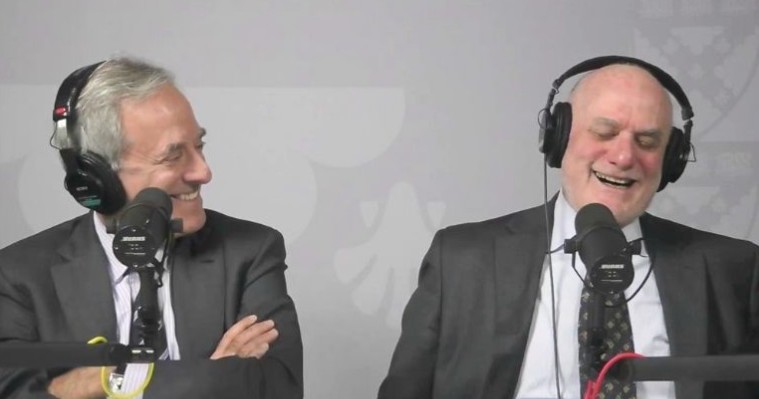Harvard Podcast Spotlights The Growing World Of Acquisition Entrepreneurship

Co-hosts Royce Yudkoff, at left, and Richard Ruback share a laugh during a recording of Think Big, Buy Small, their popular Harvard Business School podcast about entrepreneurship through acquisition.
In 2001, Logan Leslie graduated high school, enlisted in the Army after 9/11, and spent seven years in Special Forces before enrolling at Harvard College. By the time he arrived at Harvard Business School, he was a husband, father, and seasoned professional with a different perspective from many of his peers.
After completing the JD/MBA program, he didn’t join a big firm or found a startup. He started buying auto repair shops.
“Imagine buying one of these, and you’re totally dependent on this owner-operator, who probably is selling because they want to retire. And now what do you do?” says Royce Yudkoff, MBA Class of 1975 Professor of Management Practice of Entrepreneurial Management at Harvard Business School.
While not the flashiest path to entrepreneurship, Leslie’s strategy represents a road to ownership favored by a growing number of MBAs – even Harvard Business School MBAs: entrepreneurship through acquisition (ETA). Leslie centralized back-office work, standardized information systems, and leveraged purchasing power. In three years, he bought 87 shops.
His ETA story is one of many featured in Harvard Business School’s popular podcast Think Big, Buy Small, co-hosted by Yudkoff and his longtime teaching partner, Richard Ruback.
When the two started teaching ETA at Harvard 15 years ago, ETA was a specialized topic taught mainly at elite schools like Stanford and Harvard. Now any business school worth its salt has to offer ETA in some form or another. Business Insider recently called it the “hot new MBA hustle.”
“It’s the opportunity to be an entrepreneur on your own business through buying somebody else’s,” says Ruback, a Baker Foundation Professor and the Willard Prescott Smith Professor of Corporate Finance.
“And the goal, of course, is to grow it, improve it, make it better, and make it part of your life.”
Yudkoff, HBS Class of 1980, co-founded ABRY Partners, a Boston private equity firm that has completed more than $27 billion in transactions. Ruback built his career as a corporate finance scholar, earning his Ph.D. at the University of Rochester, teaching at MIT Sloan, and joining the HBS faculty in 1987.
Royce Yudkoff
Some 15 years ago, the two reconnected with an idea to collaborate on a new course that merged Yudkoff’s experience sourcing and acquiring mid-sized companies and Ruback’s deep financial knowledge. Initially, they focused on the financial management of small firms – how to operate and structure them differently from large corporations. As their research progressed, they became increasingly interested in entrepreneurship through acquisition and bringing it into the classroom.
Do you want to build your own blog website similar to this one? Contact us








